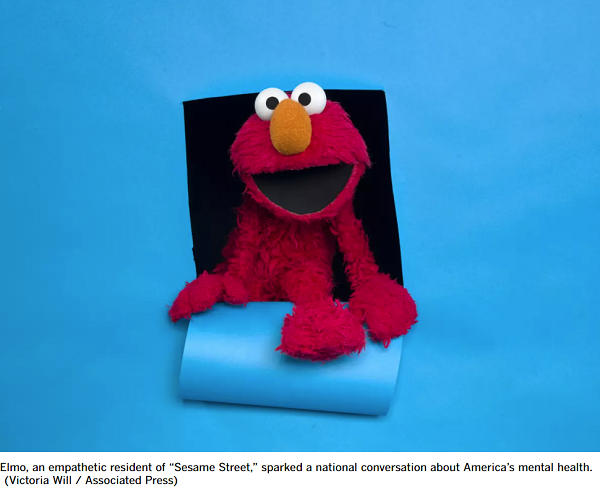What Elmo — and his human friends — learned by asking Americans about their mental health
by Karen Kaplan
August 15, 2024
 Remember when Elmo went viral in January by asking folks on the Internet how they were doing and briefly became the unofficial therapist of X?
Remember when Elmo went viral in January by asking folks on the Internet how they were doing and briefly became the unofficial therapist of X?
“The world is burning, Elmo,” an X user who goes by Not the Bee told the usually upbeat “Sesame Street” character. “No amount of tickles can fix this.”
“This world is full of pain, anger, violence, disease, power grabbing despots and poverty,” a user with the handle LiveLifeLikeSomeoneLeftTheGateOpen added in a long post. “The chasm is widening as HG Wells put it, between the ‘haves’ and ‘have nots.’”
And those were just two of the 20,000-plus replies.
Christina Vittas, Elmo’s social media manager, was bowled over by the unexpected outpouring and told The Times she was thankful that the Muppet’s simple question “opened up conversations about the serious mental health crisis in our country.”
Six months later, Elmo’s creators at Sesame Workshop have collaborated with the Harris Poll to conduct a more thorough check-in on the state of Americans’ mental health. They conducted 2,012 online interviews in May on an array of topics with a nationally representative sample of Americans ages 16 and up.
The resulting State of Well-Being Report was released this week. Among the findings:
-
27% of respondents said their mental or emotional health, or that of someone in their family, was negatively impacting their well-being. That was essentially tied with the 28% who were negatively impacted by a problem with physical health. The only issue taking a greater toll on survey participants was economic security and personal finances, a worry reported by 41%.
- Mental and emotional health were a particular burden on teens, with 54% of the 16- and 17-year-olds who took the survey saying the psychological issues had a negative impact on their overall well-being. So did 32% of parents and 41% of people who identified as LGBTQ+.
- When asked about their top concerns for their future well-being, 90% cited their and their family’s mental and emotional health as either somewhat or very important. For the sake of comparison, 89% said the same about physical health, economic security and personal finances, and having “a safe place to call home.”
- 77% of people told pollsters that to improve the well-being of future generations, the U.S. should prioritize investments in emotional and mental health. That was only slightly less than the 80% who called for more investments in economic security and slightly more than the 76% who said the country should prioritize high-quality education and learning opportunities.
- 44% of all respondents said their families were “still experiencing negative effects from the COVID19 pandemic.” That includes 57% of Black Americans and 56% of Latino Americans who took the survey. It also includes 63% of respondents who are members of Gen Z (between the ages of 18 and 27) and 57% of those who are millennials (between the ages of 28 and 43).
- When presented with a list of adjectives to describe the average American adult, only 37% selected “kind,” 35% selected “compassionate” and 33% selected “empathetic.” However, 56% said this hypothetical adult was “anxious” and 44% said they were “difficult.”
- The survey found overwhelming support for the notion that kindness is essential to the well-being of society. Fully 91% of people agreed that “kindness fosters stronger bonds between people,” making them more empathetic and supportive.
- 82% of respondents said…
